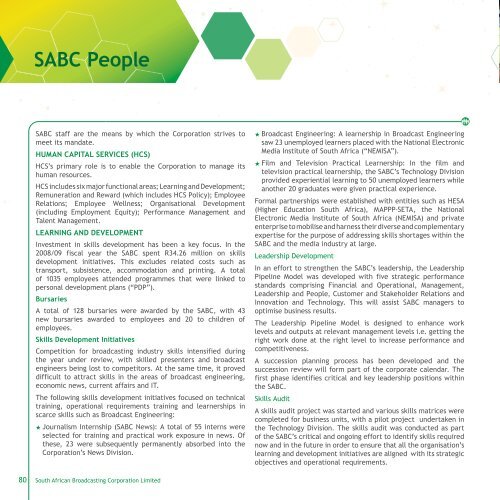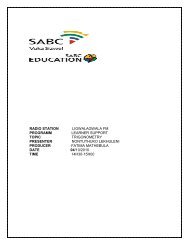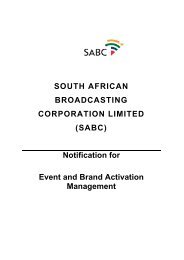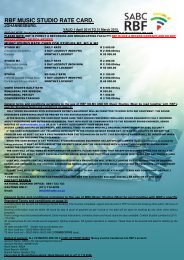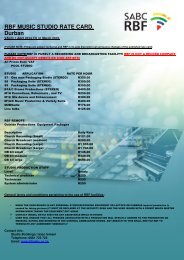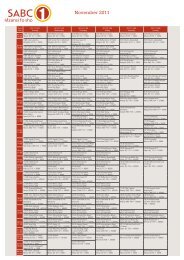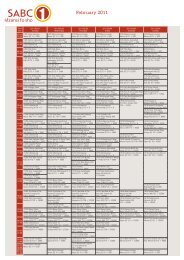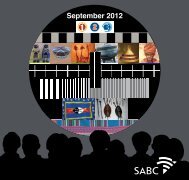About the SABC
About the SABC
About the SABC
- No tags were found...
You also want an ePaper? Increase the reach of your titles
YUMPU automatically turns print PDFs into web optimized ePapers that Google loves.
<strong>SABC</strong> People<strong>SABC</strong> staff are <strong>the</strong> means by which <strong>the</strong> Corporation strives tomeet its mandate.HUMAN CAPITAL SERVICES (HCS)HCS’s primary role is to enable <strong>the</strong> Corporation to manage itshuman resources.HCS includes six major functional areas; Learning and Development;Remuneration and Reward (which includes HCS Policy); EmployeeRelations; Employee Wellness; Organisational Development(including Employment Equity); Performance Management andTalent Management.LEARNING AND DEVELOPMENTInvestment in skills development has been a key focus. In <strong>the</strong>2008/09 fiscal year <strong>the</strong> <strong>SABC</strong> spent R34.26 million on skillsdevelopment initiatives. This excludes related costs such astransport, subsistence, accommodation and printing. A totalof 1035 employees attended programmes that were linked topersonal development plans (“PDP”).BursariesA total of 128 bursaries were awarded by <strong>the</strong> <strong>SABC</strong>, with 43new bursaries awarded to employees and 20 to children ofemployees.Skills Development InitiativesCompetition for broadcasting industry skills intensified during<strong>the</strong> year under review, with skilled presenters and broadcastengineers being lost to competitors. At <strong>the</strong> same time, it proveddifficult to attract skills in <strong>the</strong> areas of broadcast engineering,economic news, current affairs and IT.The following skills development initiatives focused on technicaltraining, operational requirements training and learnerships inscarce skills such as Broadcast Engineering:★ Journalism Internship (<strong>SABC</strong> News): A total of 55 interns wereselected for training and practical work exposure in news. Of<strong>the</strong>se, 23 were subsequently permanently absorbed into <strong>the</strong>Corporation’s News Division.★ Broadcast Engineering: A learnership in Broadcast Engineeringsaw 23 unemployed learners placed with <strong>the</strong> National ElectronicMedia Institute of South Africa (“NEMISA”).★ Film and Television Practical Learnership: In <strong>the</strong> film andtelevision practical learnership, <strong>the</strong> <strong>SABC</strong>’s Technology Divisionprovided experiential learning to 50 unemployed learners whileano<strong>the</strong>r 20 graduates were given practical experience.Formal partnerships were established with entities such as HESA(Higher Education South Africa), MAPPP-SETA, <strong>the</strong> NationalElectronic Media Institute of South Africa (NEMISA) and privateenterprise to mobilise and harness <strong>the</strong>ir diverse and complementaryexpertise for <strong>the</strong> purpose of addressing skills shortages within <strong>the</strong><strong>SABC</strong> and <strong>the</strong> media industry at large.Leadership DevelopmentIn an effort to streng<strong>the</strong>n <strong>the</strong> <strong>SABC</strong>’s leadership, <strong>the</strong> LeadershipPipeline Model was developed with five strategic performancestandards comprising Financial and Operational, Management,Leadership and People, Customer and Stakeholder Relations andInnovation and Technology. This will assist <strong>SABC</strong> managers tooptimise business results.The Leadership Pipeline Model is designed to enhance worklevels and outputs at relevant management levels i.e. getting <strong>the</strong>right work done at <strong>the</strong> right level to increase performance andcompetitiveness.A succession planning process has been developed and <strong>the</strong>succession review will form part of <strong>the</strong> corporate calendar. Thefirst phase identifies critical and key leadership positions within<strong>the</strong> <strong>SABC</strong>.Skills AuditA skills audit project was started and various skills matrices werecompleted for business units, with a pilot project undertaken in<strong>the</strong> Technology Division. The skills audit was conducted as partof <strong>the</strong> <strong>SABC</strong>’s critical and ongoing effort to identify skills requirednow and in <strong>the</strong> future in order to ensure that all <strong>the</strong> organisation’slearning and development initiatives are aligned with its strategicobjectives and operational requirements.80 South African Broadcasting Corporation Limited


